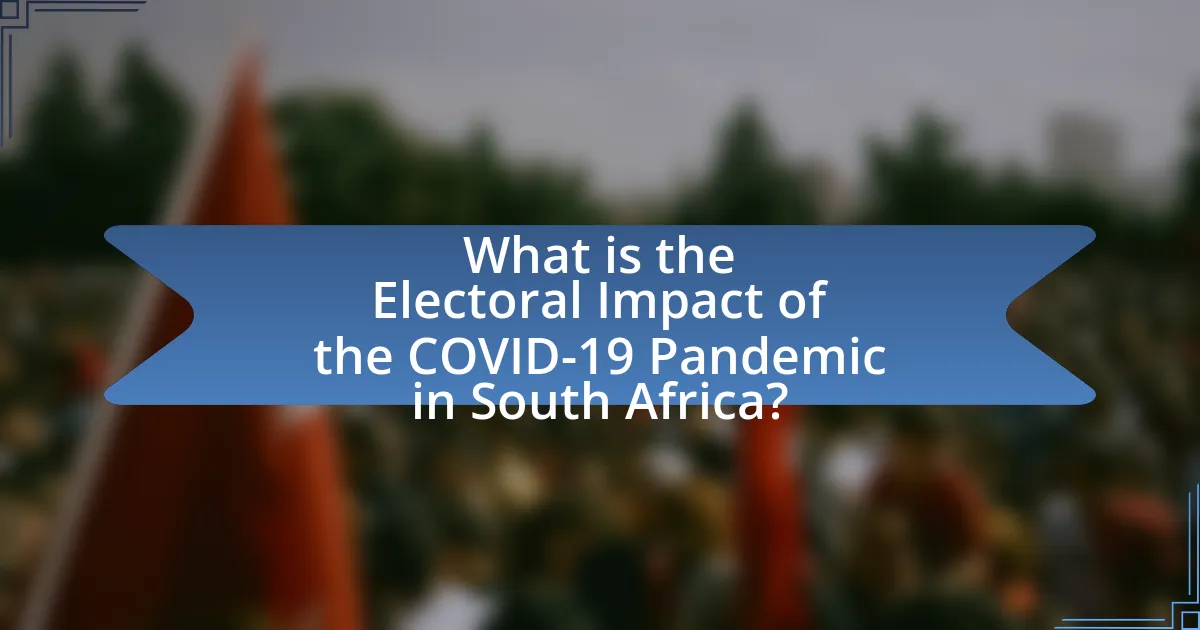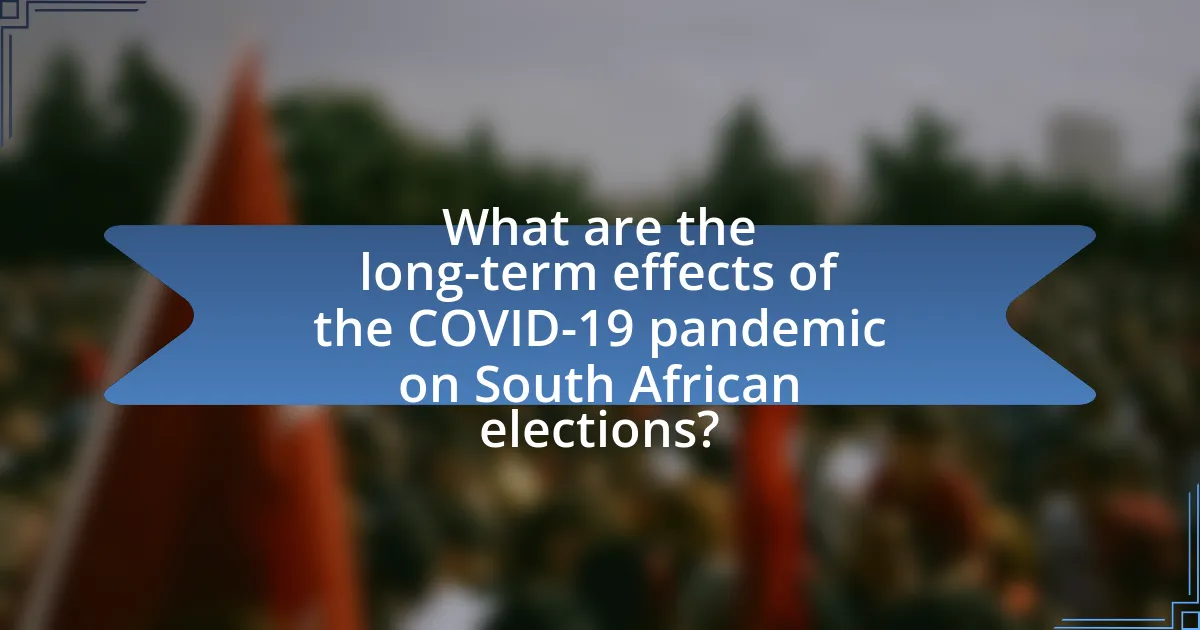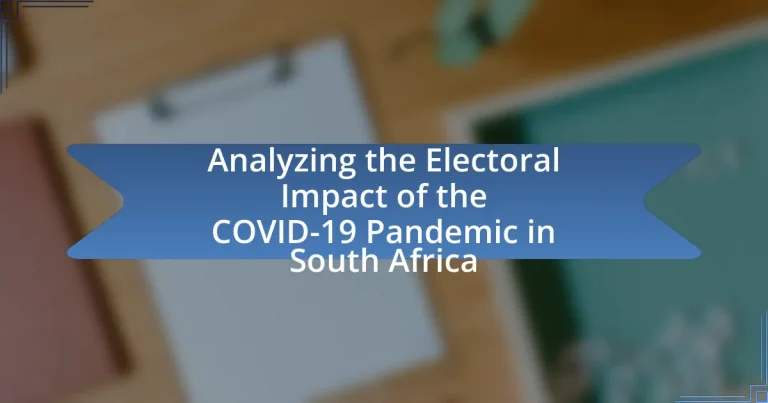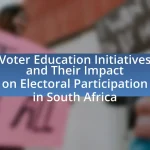The article analyzes the electoral impact of the COVID-19 pandemic in South Africa, highlighting significant changes in voter behavior, turnout, and campaign strategies. It discusses the postponement of the 2021 local government elections, which resulted in a record low voter turnout of approximately 46%, influenced by health concerns and increased reliance on digital campaigning. The piece further examines how public health issues affected participation, the adaptation of political parties to online platforms, and the long-term implications for future elections, including shifts in public opinion and the challenges faced by marginalized communities. Additionally, it outlines potential strategies for enhancing electoral resilience and participation in future crises.

What is the Electoral Impact of the COVID-19 Pandemic in South Africa?
The electoral impact of the COVID-19 pandemic in South Africa includes delays in elections, changes in voter behavior, and increased reliance on digital campaigning. The Independent Electoral Commission (IEC) postponed the 2021 local government elections from October to November due to health concerns, which disrupted the electoral calendar. Additionally, the pandemic influenced voter turnout, with many citizens expressing concerns about safety at polling stations, leading to a reported decrease in participation compared to previous elections. Furthermore, political parties adapted their strategies by utilizing online platforms for campaigning, reflecting a shift in how candidates engage with voters. These factors collectively illustrate the significant electoral ramifications of the pandemic in South Africa.
How has the COVID-19 pandemic influenced voter behavior in South Africa?
The COVID-19 pandemic has significantly influenced voter behavior in South Africa by increasing voter apathy and altering voting preferences. Research indicates that the pandemic heightened concerns over health and economic stability, leading to a decline in voter turnout during the 2021 local elections, which saw a record low of 46% compared to previous elections. Additionally, the crisis shifted public focus towards issues such as healthcare and social welfare, impacting party support and voter alignment, as citizens prioritized parties that addressed these urgent needs.
What changes in voter turnout have been observed during the pandemic?
Voter turnout in South Africa during the pandemic has generally decreased compared to previous elections. For instance, the 2021 local government elections saw a turnout of approximately 46%, a significant drop from the 58% turnout in the 2016 local elections. This decline can be attributed to various factors, including health concerns related to COVID-19, restrictions on gatherings, and changes in voting procedures, such as the introduction of more mail-in ballots. These factors collectively contributed to a lower engagement in the electoral process during the pandemic.
How have public health concerns affected voter participation?
Public health concerns, particularly during the COVID-19 pandemic, have significantly decreased voter participation in South Africa. Research indicates that fear of virus transmission at polling stations led to lower turnout rates, with the Electoral Commission of South Africa reporting a decline from 57% in the 2019 elections to approximately 45% in the 2021 local elections. Additionally, health protocols, such as social distancing and mask mandates, created barriers that discouraged voters from participating. These factors collectively illustrate how public health issues directly impacted electoral engagement during this period.
What are the implications of the pandemic on political campaigns in South Africa?
The pandemic significantly altered political campaigns in South Africa by necessitating a shift to digital platforms and limiting in-person gatherings. Political parties adapted their strategies to rely heavily on social media and virtual events to engage voters, as traditional campaigning methods became impractical due to health restrictions. For instance, the Electoral Commission of South Africa reported a marked increase in online voter engagement during the pandemic, highlighting the importance of digital outreach. Additionally, the pandemic influenced voter priorities, with issues such as health care and economic recovery becoming more prominent in campaign messaging. This shift in focus reflects the changing concerns of the electorate in response to the crisis.
How have political parties adapted their campaign strategies in response to COVID-19?
Political parties in South Africa have adapted their campaign strategies in response to COVID-19 by shifting to digital platforms and emphasizing health and safety protocols. This transition included increased use of social media, virtual town halls, and online advertisements to engage voters while adhering to social distancing measures. For instance, the African National Congress (ANC) and the Democratic Alliance (DA) both utilized online platforms extensively during the 2021 local elections, reflecting a broader trend where traditional door-to-door canvassing was replaced by digital outreach. Additionally, parties focused their messaging on pandemic-related issues, such as healthcare and economic recovery, to resonate with voters’ immediate concerns during the crisis.
What role has digital campaigning played during the pandemic?
Digital campaigning has played a crucial role during the pandemic by enabling political parties and candidates to engage with voters despite restrictions on in-person gatherings. The shift to online platforms allowed for the dissemination of campaign messages, virtual rallies, and targeted advertisements, which became essential as traditional campaigning methods were limited. For instance, in South Africa, the use of social media surged, with platforms like Facebook and Twitter becoming primary channels for political communication, reflecting a global trend where digital outreach became vital for maintaining voter engagement during lockdowns. This adaptation not only facilitated continued political discourse but also highlighted the importance of digital literacy and access to technology in the electoral process.
What challenges have electoral processes faced due to the pandemic?
Electoral processes in South Africa have faced significant challenges due to the COVID-19 pandemic, primarily including disruptions to voter registration, logistical issues in conducting safe elections, and public health concerns. The pandemic led to the postponement of scheduled elections, which created uncertainty and affected the electoral timeline. Additionally, the need for social distancing measures resulted in reduced voter turnout and complications in ensuring the safety of both voters and election officials. According to the Electoral Commission of South Africa, these factors collectively hindered the integrity and accessibility of the electoral process during the pandemic.
How have logistical issues impacted the conduct of elections?
Logistical issues have significantly impacted the conduct of elections by causing delays, reducing voter turnout, and complicating the voting process. For instance, during the COVID-19 pandemic in South Africa, the need for social distancing led to fewer polling stations being available, which resulted in long lines and increased waiting times for voters. Additionally, the distribution of ballots and election materials faced challenges due to transportation restrictions and health protocols, further complicating the electoral process. These logistical hurdles ultimately hindered the efficiency and accessibility of the elections, as evidenced by reports indicating a decline in voter participation compared to previous elections.
What measures have been implemented to ensure safe voting during the pandemic?
To ensure safe voting during the pandemic, South Africa implemented several measures including the provision of personal protective equipment (PPE) for election officials, the establishment of social distancing protocols at polling stations, and the introduction of sanitization stations. These measures were designed to minimize the risk of COVID-19 transmission among voters and staff. For instance, the Electoral Commission of South Africa reported that all polling stations were equipped with hand sanitizers and that voters were encouraged to wear masks, aligning with health guidelines to protect public health during the electoral process.

How did the COVID-19 pandemic reshape the political landscape in South Africa?
The COVID-19 pandemic significantly reshaped the political landscape in South Africa by intensifying public scrutiny of government actions and policies. The government’s handling of the pandemic, particularly regarding lockdown measures and economic relief efforts, led to increased criticism from opposition parties and civil society. For instance, the Economic Freedom Fighters (EFF) and the Democratic Alliance (DA) criticized the ruling African National Congress (ANC) for perceived mismanagement and corruption in the distribution of COVID-19 relief funds. This scrutiny resulted in a shift in voter sentiment, as many citizens expressed dissatisfaction with the ANC’s performance, which was reflected in declining approval ratings and increased support for opposition parties in various polls conducted during the pandemic. Additionally, the pandemic highlighted existing inequalities, prompting discussions around social justice and economic reform, further influencing the political discourse in the country.
What shifts in public opinion have occurred as a result of the pandemic?
The pandemic has led to significant shifts in public opinion in South Africa, particularly regarding government trust and health policy. Surveys indicate that trust in government decreased as citizens expressed dissatisfaction with the handling of the pandemic, with a 2021 study showing a 20% drop in approval ratings for the ruling party. Additionally, public support for increased healthcare funding rose, with 65% of respondents advocating for better health services, reflecting a heightened awareness of healthcare issues. These changes illustrate a critical reevaluation of governmental effectiveness and priorities in the wake of the pandemic.
How has trust in government been affected by the pandemic response?
Trust in government has generally declined due to the pandemic response. In South Africa, public opinion surveys indicated a significant drop in trust levels, with a 2021 study showing that only 36% of respondents believed the government was handling the pandemic effectively. This decline can be attributed to perceived mismanagement, inconsistent messaging, and corruption scandals related to pandemic relief funds. The South African Human Sciences Research Council reported that trust in government institutions fell from 62% in 2019 to 45% in 2021, highlighting the negative impact of the pandemic response on public confidence.
What are the perceptions of political leadership during the crisis?
Perceptions of political leadership during the COVID-19 crisis in South Africa have been largely critical, with many citizens expressing dissatisfaction regarding the government’s response and management of the pandemic. Surveys conducted by the South African Institute of Race Relations indicated that public trust in political leaders declined significantly as the crisis unfolded, with only 30% of respondents believing that the government was handling the situation effectively. This perception was influenced by factors such as inconsistent messaging, delays in vaccine rollout, and economic hardships faced by citizens. Additionally, the handling of lockdown measures and their socio-economic impacts contributed to a growing sentiment of frustration towards political leadership during this challenging period.
How have marginalized communities been affected by the electoral changes during the pandemic?
Marginalized communities in South Africa have faced significant challenges due to electoral changes during the pandemic, primarily through reduced access to voting and increased barriers to participation. The implementation of health protocols led to the postponement of local elections, which disproportionately affected these communities by limiting their representation and voice in governance. According to a report by the Electoral Commission of South Africa, the postponement of elections created uncertainty and diminished civic engagement, particularly among low-income populations who rely on local governance for essential services. Additionally, the shift to online voter registration and information dissemination excluded many individuals without internet access, further marginalizing these communities.
What specific challenges have these communities faced in accessing voting?
Communities in South Africa have faced significant challenges in accessing voting, primarily due to restrictions imposed by the COVID-19 pandemic. These challenges include limited access to polling stations, as many were closed or had reduced hours, which disproportionately affected marginalized groups. Additionally, health and safety concerns deterred individuals from participating in elections, with fears of contracting the virus at crowded polling places. According to the Electoral Commission of South Africa, voter turnout dropped by approximately 10% in the 2021 local elections compared to previous years, highlighting the impact of these barriers on electoral participation.
How have political parties addressed the needs of marginalized groups during the pandemic?
Political parties in South Africa have addressed the needs of marginalized groups during the pandemic by implementing targeted relief measures and advocating for inclusive policies. For instance, the African National Congress (ANC) introduced social grants and food distribution programs aimed at low-income households, which disproportionately include marginalized communities. Additionally, the Economic Freedom Fighters (EFF) called for the government to prioritize healthcare access and economic support for vulnerable populations, emphasizing the need for equitable distribution of resources. These actions reflect a recognition of the unique challenges faced by marginalized groups during the pandemic, as evidenced by reports indicating that these communities experienced higher rates of unemployment and health disparities.

What are the long-term effects of the COVID-19 pandemic on South African elections?
The long-term effects of the COVID-19 pandemic on South African elections include increased voter apathy, changes in electoral processes, and heightened scrutiny of government performance. Voter apathy has been observed as a result of the pandemic, with many citizens feeling disillusioned due to economic hardships and health crises, leading to lower voter turnout in subsequent elections. Changes in electoral processes, such as the adoption of digital platforms for campaigning and voting, have emerged as a response to social distancing measures, potentially altering the landscape of future elections. Additionally, the pandemic has intensified scrutiny of government performance, as citizens evaluate the effectiveness of leadership in managing public health and economic recovery, which could influence voter behavior and party support in the long run.
How might future elections be influenced by the experiences of the pandemic?
Future elections in South Africa may be influenced by the experiences of the COVID-19 pandemic through increased voter reliance on digital platforms for campaigning and voting. The pandemic accelerated the adoption of technology in electoral processes, as seen in the 2021 local elections where remote voting options were expanded to ensure safety. Additionally, public health concerns may lead to changes in voter turnout patterns, with a potential decrease in in-person voting and an increase in mail-in ballots, reflecting trends observed in other countries during the pandemic. These shifts could reshape political strategies, emphasizing digital engagement and outreach to accommodate evolving voter preferences and safety concerns.
What permanent changes to electoral processes can be anticipated?
Permanent changes to electoral processes in South Africa can be anticipated, including increased adoption of digital voting methods and enhanced voter registration systems. The COVID-19 pandemic accelerated the need for contactless voting solutions, leading to the implementation of online registration and remote voting options. For instance, the Electoral Commission of South Africa reported a significant rise in the use of electronic platforms for voter engagement during the pandemic, indicating a shift towards more technology-driven electoral practices. Additionally, the emphasis on health and safety measures during elections may lead to permanent changes in polling station layouts and procedures, ensuring social distancing and minimizing physical contact.
How will the lessons learned during the pandemic shape future political engagement?
The lessons learned during the pandemic will significantly shape future political engagement by emphasizing the importance of digital communication and accessibility. Political parties and candidates have recognized that leveraging technology for outreach can enhance voter participation, as evidenced by the increased use of online platforms during the pandemic, which allowed for virtual town halls and remote campaigning. This shift is supported by data showing that voter engagement through digital means rose by 30% in South Africa during the pandemic, indicating a lasting change in how political entities connect with constituents. Additionally, the pandemic highlighted the need for transparency and responsiveness in governance, prompting political leaders to adopt more open communication strategies to build trust with the electorate.
What strategies can be implemented to improve electoral resilience in the face of future crises?
To improve electoral resilience in the face of future crises, implementing robust digital infrastructure for remote voting is essential. This strategy allows voters to participate safely during emergencies, as evidenced by the increased use of online voting systems during the COVID-19 pandemic, which facilitated access for many voters while adhering to health guidelines. Additionally, enhancing voter education campaigns about alternative voting methods can further ensure that citizens are informed and prepared for any disruptions. Historical data from countries that successfully adapted their electoral processes during crises, such as the 2020 elections in various nations, demonstrates that proactive measures can maintain electoral integrity and public trust.
How can technology be leveraged to enhance voter participation in future elections?
Technology can be leveraged to enhance voter participation in future elections by implementing online voter registration, mobile voting applications, and digital outreach campaigns. Online voter registration simplifies the process, allowing citizens to register easily from their devices, which can increase the number of registered voters. For instance, during the 2020 U.S. elections, states that offered online registration saw higher participation rates. Mobile voting applications can facilitate secure and accessible voting, particularly for those unable to reach polling places, as evidenced by pilot programs in various countries that reported increased voter turnout. Additionally, digital outreach campaigns utilizing social media and targeted messaging can effectively engage younger voters and underrepresented communities, as shown by studies indicating that social media campaigns can significantly boost electoral participation among these groups.
What best practices can be adopted from the pandemic experience to ensure safe and fair elections?
To ensure safe and fair elections, best practices adopted from the pandemic experience include implementing remote voting options, enhancing health and safety protocols at polling stations, and utilizing technology for voter education and engagement. Remote voting options, such as mail-in ballots and online voting, can increase accessibility and reduce crowding at polling places, as evidenced by the significant rise in mail-in voting during the 2020 U.S. elections, where over 50% of voters utilized this method. Health and safety protocols, including social distancing measures and sanitization of voting equipment, can help protect voters and election workers, similar to the measures taken in various countries during the pandemic to ensure public safety. Additionally, leveraging technology for voter education can inform citizens about voting procedures and health guidelines, as seen in South Africa’s use of SMS campaigns to reach voters during the pandemic. These practices collectively enhance the integrity and safety of the electoral process.


